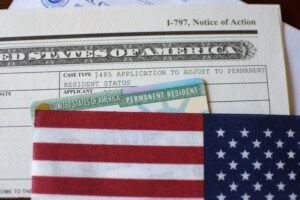
Navigating the path to U.S. immigration can feel like embarking on a complex journey. One frequently encountered question on this journey is: “Can a conditional green card holder file an immigrant petition?”
This blog post provides an in-depth look at the nuances involved in this question, including why working with a trusted immigration attorney is wise.
What Is a Conditional Green Card?
To fully grasp the matter, we first need to understand what a conditional green card is. A conditional green card, a Conditional Permanent Resident (CPR) card, is a residence permit granted to certain immigrants under specific circumstances.
These conditional cards are primarily issued to spouses of U.S. citizens or permanent residents whose marriage is less than two years old when the green card is granted. The reason for the “conditional” nature of this green card is to ensure that the marriage wasn’t solely intended to bypass immigration laws. Therefore, the conditional green card serves as a form of provisional residence status, which the couple must later validate as based on a genuine relationship.
For a free legal consultation, call (678) 888-2222
The Conditional Green Card Timeline
Understanding the timeline associated with a conditional green card is critical. This type of card is only valid for two years.
Within 90 days before the card’s expiration, the holder must file Form I-751, Petition to Remove Conditions on Residence. This process is crucial to transition from a conditional status to a “permanent” one, extending the validity of their green card to 10 years.
Filing the I-751 petition requires the cardholder to provide evidence that their marriage is genuine and not simply a way to gain immigration benefits. Evidence can include shared financial documents, proof of cohabitation, or affidavits from people who can affirm the legitimacy of the marriage. Failure to file this form on time, or inability to provide satisfactory proof, could result in losing the cardholder’s status and possible deportation.
Can a Conditional Green Card Holder File an Immigrant Petition?
As outlined in the rules and regulations set forth by the U.S. Citizenship and Immigration Services (USCIS), individuals holding a conditional green card have the legal capacity to file an immigrant petition. In the context of immigration law, this implies that these individuals can complete and submit Form I-130, officially known as the Petition for Alien Relative.
Filing this form is the first crucial step in the immigration process for many families, and it enables U.S. citizens or permanent residents to establish their relationship with certain alien relatives who wish to immigrate to the United States. For conditional green card holders, the scope of this privilege includes the following categories of immediate relatives:
- Their spouse, which makes sense as most conditional green cards are issued based on a marital relationship to a U.S. citizen or permanent resident.
- Their unmarried children are under 21, allowing the cardholder to ensure their nuclear family unit can stay intact.
- Their parents, although this only applies if the petitioner is at least 21. This allows for family reunification that extends beyond the immediate nuclear family.
While this right to file a petition is unambiguous, it’s vital to understand that this doesn’t automatically translate into approval. Filing the petition is just the initial step in a multistage process. The petition’s approval depends on several factors that USCIS considers in its adjudication process.
Click to contact our personal injury lawyers today
Challenges that May Arise
While conditional green card holders can file an immigrant petition, potential obstacles lie ahead. The conditional status of their residency, subject to close examination, can influence the processing of the immigrant petition. This underscores the crucial role of understanding and adhering to the requirements associated with conditional residency.
On the other hand, failure to timely remove the conditions attached to the green card or a denial of the I-751 petition presents additional challenges. Such scenarios will almost certainly negatively impact any immigrant petitions filed by the conditional green card holder. These potential outcomes emphasize the need for meticulous compliance with USCIS guidelines and timelines.
As a result, comprehending these potential challenges and preparing effective strategies to handle them is essential. Navigating the immigration process is intricate and demands careful planning and execution. Knowledge of the possible hurdles forms a crucial part of this journey, ensuring a smoother path toward achieving immigration goals.
Complete a Free Case Evaluation form now
Understanding the Role of Visa Availability
One crucial aspect of the immigration process is the role of visa availability. Each year, the United States has limited visas to be issued. This means that even if a petition is approved, the applicant may have to wait for a visa to become available.
The wait time can vary significantly based on factors such as the applicant’s home country and their relationship with the petitioner.
The Benefits of Legal Counsel
Due to the intricate nature of immigration laws, securing legal counsel is often advantageous. Immigration attorneys possess the requisite experience and can offer personalized advice grounded in the unique details of your case. Their expertise can illuminate the path forward and aid in understanding the complexities of immigration laws.
Attorneys can also guide you through the application process. They know the ins and outs of filing petitions, compiling appropriate supporting documents, and meeting crucial deadlines. Their guidance can remove much of the guesswork and stress from the process.
Importantly, legal counsel can help respond effectively to any requests for additional evidence from USCIS. They can foresee potential pitfalls, helping to avoid errors that could lead to delays or even the denial of your petition. Engaging an immigration attorney can be a significant asset in navigating the immigration landscape.
The Impact on U.S. Citizenship Application
As a conditional green card holder, you might be interested in eventually becoming a U.S. citizen. It’s important to note that while your conditional status doesn’t prevent you from applying for naturalization, the conditions on your residence must be removed before you become a U.S. citizen.
You can proceed with the application, but USCIS will review the I-751 petition during your naturalization interview. Contact Barrios Virguez for help with your case.
Call or text (678) 888-2222 or complete a Free Case Evaluation form

